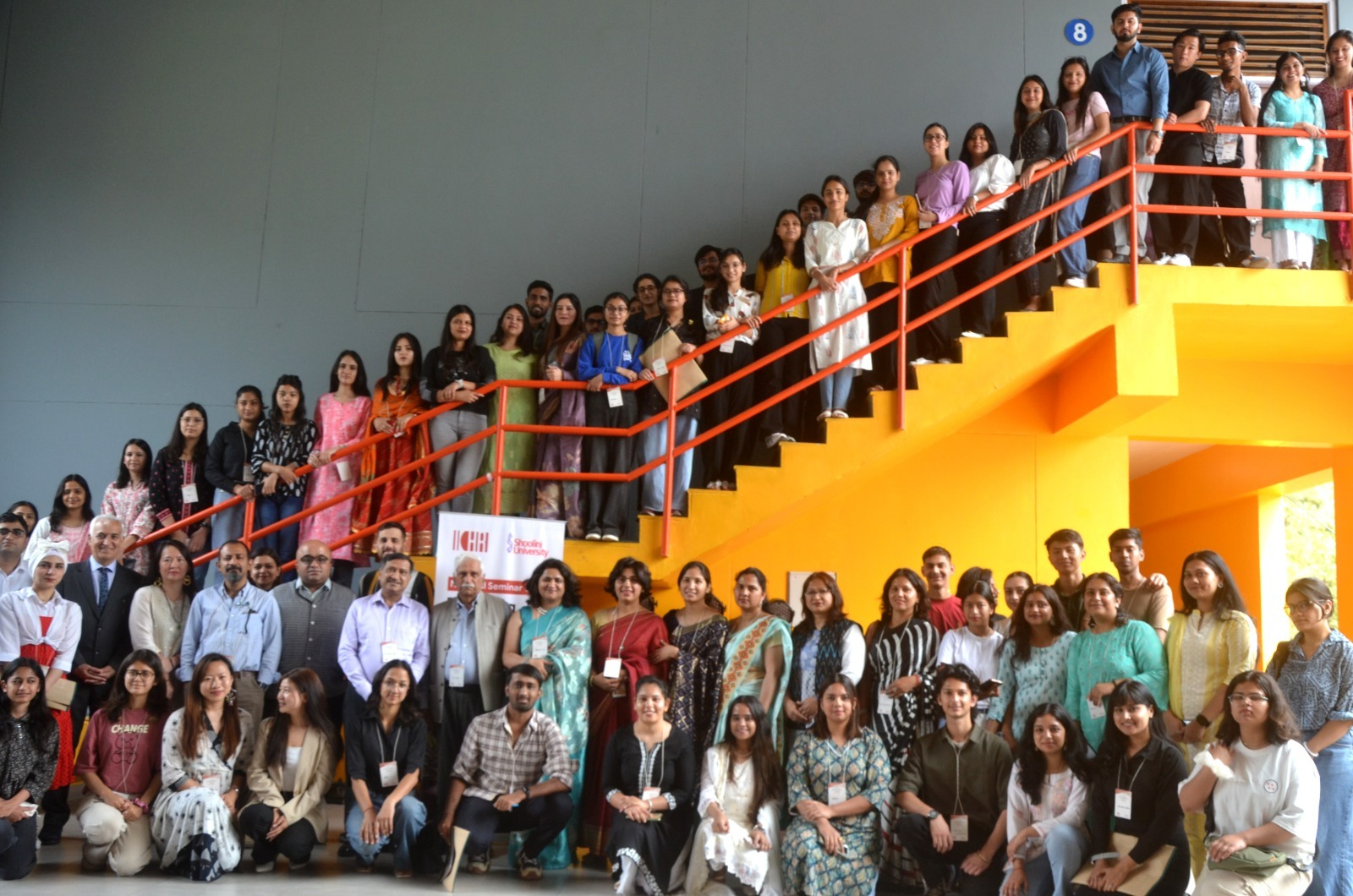Shoolini University recently hosted a National Seminar in collaboration with the Indian Council of Historical Research, Chitrakoot School of Liberal Arts (CSLA), and the School of Biotechnology. The topic of the two-day seminar held on May 10-11th was ‘Exploring the History of Traditional Medicine in the Himalayas’. The seminar discussed important issues like the wisdom of the mountains, old and new remedies, and how traditional medicine could also be a business opportunity.
After the welcome address by Assistant Professor Nitika Thakur, the soulful rendition of Saraswati Vandana mesmerised the guests. Shoolini University Director of Planning Prof JM Julka and the Ayurveda Acharya Chander Gupt were the guests of honour.
Prof Purnima Bali, head of the Chitrakoot School of Liberal Arts, addressed the audience, setting the stage for an educative discussion. Assistant Prof Ekta Singh contextualised the theme of the seminar.
Starting the discussion, Prof JM Jhulka shared his profound experiences spanning over six decades, particularly his lifelong engagement with traditional medicinal herbs. He expressed his faith in medicinal herbs and encouraged the audience to depend more on nature for a long and healthy life.
Ayurveda Acharya Chander Gupt and Purnima Bali started the first interactive session of Day 1 with a discussion revolving around the benefits of Ayurveda. The Ayurveda Acharya explained the difference between Ayurveda and Homeopathy, emphasising the importance of lifestyle for overall wellness.
Assistant Professor Neelam Negi from the Department of History, HNB, Garhwal University, Uttarakhand, scooped into the rich history of traditional medicines in the Himalayan region of Uttarakhand. She highlighted the medicinal properties of rare herbs found in the region.
Tracing the history of Kangra Tea, Assistant Professor Rohit Sharma explained the historical significance and the ongoing efforts to revive its importance. Talking about the age-old medications derived from the Himalayas, Prof Rohit Goyal demonstrated their effectiveness in modern times. Scholar Nikhil Thakur enchanted the audience with his oral presentation on the folk healing practices of the Gaddi Tribe, bridging ancient wisdom with contemporary healthcare.
During the second session of Day 1, Assistant Professor Tara Devi Sen from the Department of Botany at Vallabh Government College, Mandi, talked about discovering forgotten remedies in Himalayan wild foods. Talking about overall health, Asst Prof Tara Devi added, “There are many ways to incorporate medicinal herbs into our daily life, such as by preparing salads, snacks, juice, curries, etc.”
Prof Deepak Kumar expressed how traditional medicines can help discover new drugs. He pointed out that combining traditional medication with modern drugs can lead to fewer side effects, making them safer.
The first day ended on a high note with a vibrant cultural programme, celebrating the diverse heritage of the Himalayas.
On the second day of the session, Principal Scientist Amit Chawla from the CSIR-Institute of Himalayan Bioresource Technology, Palampur, delivered a presentation on the ‘Conservation of Threatened Medicinal Plants’. He explained the crucial role these plants played in the food web and underlined the need to prevent their extinction. Chawla also discussed the medicinal value of each plant species and emphasised the importance of preserving these natural resources.
Following this, Assistant Professor Radha focused on traditional medicinal knowledge in the cold desert of the Northwestern Himalayan region. She highlighted the significance of Saussurea obvallata, a plant revered in the Himalayas for its purity and healing properties. This sacred plant is a valuable part of the region’s traditional medicine.
Dean of Research, Professor Sourabh Kulshreshtha, then shared insights on the numerous benefits of Moringa oleifera, commonly known as ‘The Miracle Tree’. He explained, “The leaves of this tree are rich in nutrients and possess healing properties, making it a valuable resource for various health applications. The seeds of Moringa oleifera can also purify contaminated water.”
Concluding the session, Akshay Sharma addressed the valedictory audience with a discussion on the benefits of learning Ayurveda, a traditional system of medicine used to cure various illnesses. He added, “Ayurveda is gaining popularity globally due to its holistic approach to health and wellness.” Seminar convenor Dr Ashoo Khosla, the Chief Learning Officer at Shoolini, thanked the attendees.
The Seminar served as a platform for scholarly exchange, reaffirming the rich legacy of traditional medicines in the Himalayas and their enduring relevance in contemporary healthcare practices.
Impact News Team
May 11, 2024
